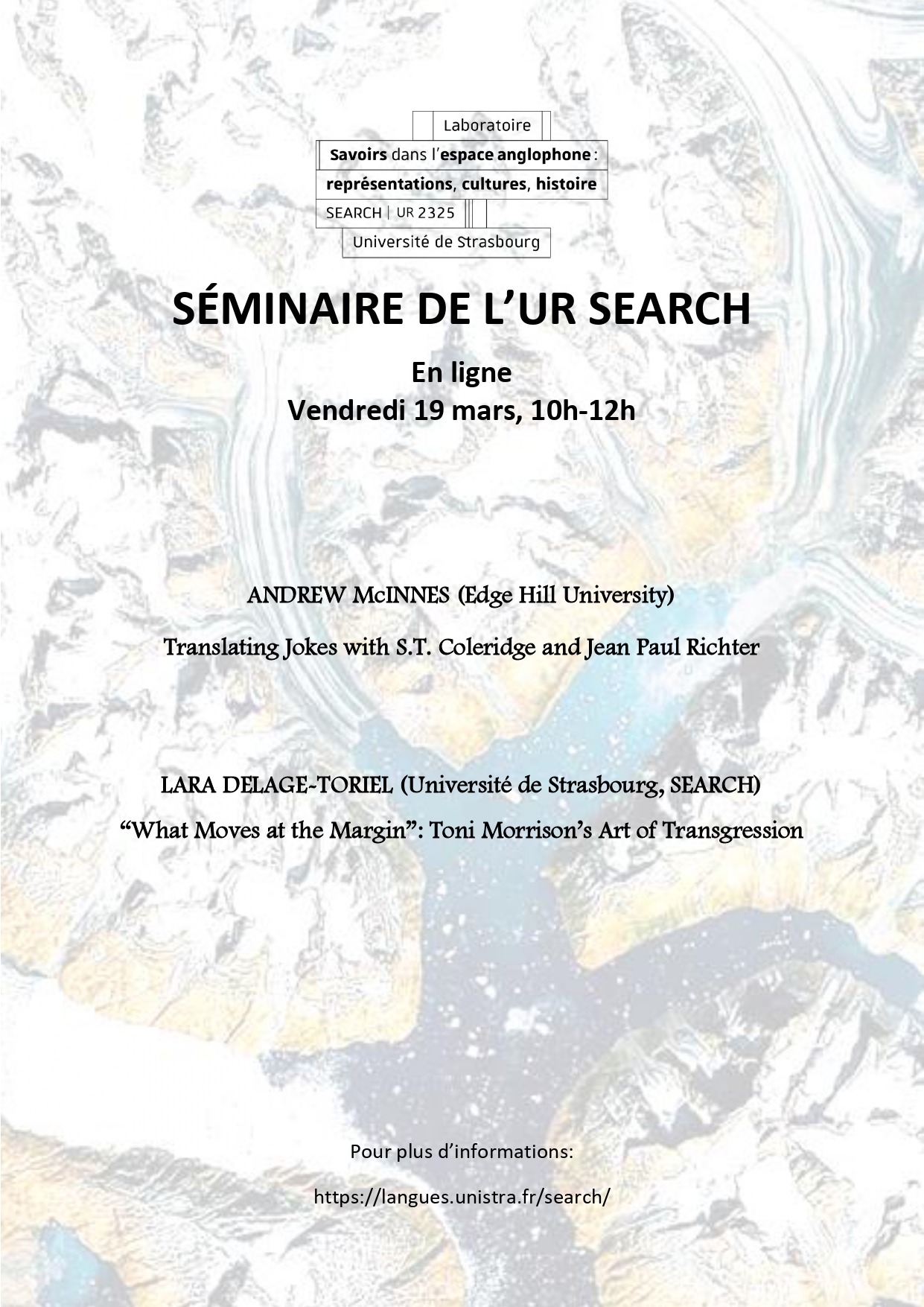Focusing on different periods and geographical areas, these papers both suggest that border crossings within and across languages can be transgressive acts with the power to create spaces for new forms of bonds. Confronting these perspectives on Samuel Coleridge’s translations in the Romantic period in Britain and Toni Morrison’s twentieth-century American prose promises to be particularly enlightening and an extremely fruitful addition to the ongoing discussion around the notion of borders within the SEARCH team.
Andrew McInnes: Translating Jokes with S. T. Coleridge and Jean Paul Richter
When crossing borders, humour is said to be one of the first things to be lost in translation. Over the course of at least a decade, the English poet Samuel Taylor Coleridge put this maxim to the test when translating and transfiguring the aphorisms of Johannes Paul ‘Jean Paul’ Friedrich Richter, the German Romantic novelist, satirist, and philosopher. Jean Paul theorized the ridiculous as a counter-sublime, bringing people together in shared laughter, rather than isolating them in their individual responses to nature and other stimuli. Coleridge responded to Jean Paul’s writing by mixing his translations with his own idiosyncratic interests, finding solace in the German writer’s intricate similes and symbols. Indeed, in several entries in his notebooks, Coleridge made the process of translation part of the joke. Finally, Coleridge draws on the inspiration he found in crossing boundaries with his translations of Jean Paul in his own lectures on wit and humour, using the German author’s sense of the ridiculous to explore humour’s transgressive potential.
Bio: Dr. Andrew McInnes is Reader in Romanticism in the Department of English, History & Creative Writing at Edge Hill University. His research interests include the eighteenth-century novel, women’s writing and engagement with the Gothic and literary geographies within Romanticism, reader-response and reception theory, and children’s literature ranging from the eighteenth to the twenty-first centuries. He is the author of Wollstonecraft’s Ghost: The Fate of the Female Philosopher in the Romantic Period (Abingdon: Routledge, 2016), and has co-edited the special issue ‘Edgy Romanticism’ of Romanticism 24.2 (July 2018). He is currently on a two-year research leave after having been awarded funding as an Arts and Humanities Research Council (AHRC) Early Career Leadership Fellow on the project ‘The Romantic Ridiculous’.
Lara Delage-Toriel: “What Moves at the Margin”: Toni Morrison’s Art of Transgression
When associating margins with the idea of motion in her Nobel Lecture, Toni Morrison reminds her audience how fertile the often neglected land that lies on the edge, which she invites us to consider not only as a transitional site one moves away from or across, but as a place which in itself and within itself may host and generate transformative currents or trends. Likewise, just as the somewhat oxymoronic concept of the “étranger chez soi” (to cite the title of the Louvre exhibition she curated in 2006) acts as a leitmotiv in her fiction, settling within unsettling grounds appears to be one of the author’s favoured writing modes.
This paper will explore some of the ways in which Morrison’s work “worries the line,” to borrow from blues cant,* most obviously by granting central positions to socially marginal and dissonant characters like Pecola, Sula, Pilate and Sethe in The Bluest Eye, Sula, Song of Solomon and Beloved, so as to shift, or even subvert, at a deeper level, the boundaries that most often both bind and separate the respective provinces of writers and their readers.
* ‘worrying the line’ is the blues technique of breaking up a phrase by changing pitch, adding a shout, or repeating words in order to emphasize, clarify, or subvert a moment in a song.
Bio: Dr. Lara Delage-Toriel is Associate Professor of English Literature at the University of Strasbourg. Her research on twentieth and twenty-first American novels focuses on literary representations of the body, with a particular interest in Toni Morrison and Vladimir Nabokov. She is the author of Lolita de Vladimir Nabokov et Stanley Kubrick (Paris : Editions du Temps, 2009) and has co-edited Kaleidoscopic Nabokov. Perspectives Françaises (Paris : Michel Houdiard, 2009) and Nabokov et la France (Strasbourg: Presses Universitaires de Strasbourg, 2017). She is currently President of the International Vladimir Nabokov Society.
